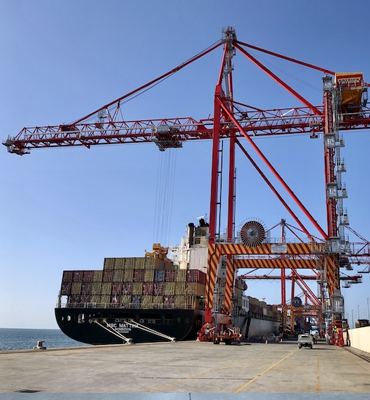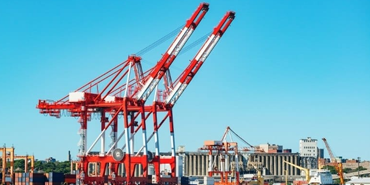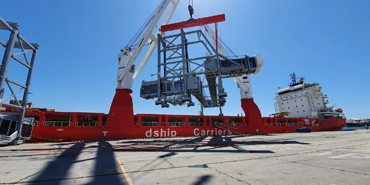Cargo Cranes
Cargo cranes, also known as cargo handling cranes or shipboard cranes, are specialized equipment used for loading and unloading cargo onto and from ships or vessels in ports and harbors. These cranes play a crucial role in facilitating the efficient and safe movement of goods between the ship and the port's storage facilities or transportation networks.
Key features and types of cargo cranes include:
-
Types of Cargo Cranes::
-
Ship-to-Shore (STS) Cranes:
These large cranes are typically used in container terminals and are capable of reaching over the entire width of a container ship to load and unload containers from the ship's deck.
-
Mobile Harbor Cranes (MHC):
These versatile cranes can be easily moved around the port to handle different types of cargo, including containers, bulk goods, and break-bulk cargo.
-
Gantry Cranes:
Gantry cranes are often used in container yards to move containers between the ship, yard, and other transport modes. They can also be used for handling heavy and oversized cargo.
-
Bulk Handling Cranes:
These cranes are designed specifically for bulk cargo, such as coal, grain, and ores. They use specialized attachments like grabs or buckets to handle loose bulk materials efficiently.
-
Floating Cranes:
Floating cranes are mounted on barges or floating platforms, enabling them to handle cargo in areas without dedicated port infrastructure.
-
Capacity and Reach:
Cargo cranes come in various sizes and lifting capacities, depending on the type of cargo they handle and the size of the vessels they serve. Larger vessels and heavy cargo require cranes with higher lifting capacities and longer reach
-
Controls and Automation:
Modern cargo cranes often come equipped with advanced control systems and automation features, allowing precise and efficient cargo handling operations. Automated cranes can improve productivity and reduce the need for extensive manual labor.
-
Safety Features:
Cargo cranes incorporate safety features to protect both the operators and the cargo being handled. These features may include anti-collision systems, load monitoring, and emergency stop mechanisms.
-
Integration with Port Infrastructure:
Cargo cranes are typically integrated into the port's infrastructure, including container yards, bulk terminals, and other cargo handling facilities.
-
Maintenance and Service:
Regular maintenance and service are essential to keep cargo cranes in optimal working condition and ensure their longevity.
Cargo cranes are essential components of modern logistics and play a crucial role in the efficient movement of goods between ships and the port's transportation and storage facilities. Their efficiency and reliability are vital to ensure smooth and timely cargo operations, supporting international trade and global supply chains.


